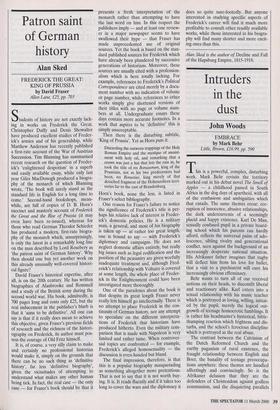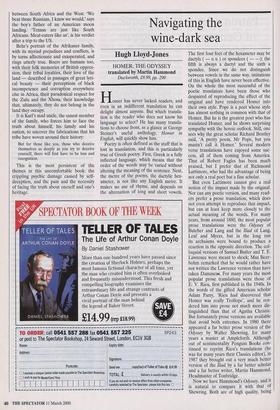Intruders in the dust
John Woods
EMBRACE by Mark Behr Little, Brown, £16.99, pp. 590 This is a powerful, complex, disturbing work. Mark Behr revisits the territory marked out in his debut novel The Smell of Apples — a childhood passed in South Africa in the dog days of apartheid, with all of the confusions and ambiguities which that entails. The same themes recur: cor- ruption of innocence, abusive relationships, the dark undercurrents of a seemingly placid and happy existence. Karl De Man, sexually confused pupil in a private board- ing school which his parents can hardly afford, reflects the universal pains of ado- lescence, sibling rivalry and generational conflict, seen against the background of an increasingly desperate national situation. His Afrikaner father imagines that rugby will deflect him from his love for ballet, that a visit to a psychiatrist will cure his increasingly obvious effeminacy.
Behr wants to turn all of our received notions on their heads, to discomfit liberal and reactionary alike. Karl enters into a sexual relationship with his music teacher which is portrayed as loving, willing, initiat- ed by the pupil, merely the logical out- growth of teenage homoerotic fumblings. It is rather his headmaster's hysterical, bible- thumping reaction which frightens and dis- turbs, and the school's ferocious discipline which is portrayed as the real abuse.
The contrast between the Calvinism of the Dutch Reformed Church and the earthy paganism of rural existence, the fraught relationship between English and Boer, the banality of teenage preoccupa- tions anywhere: these themes are handled affectingly and convincingly. So is the Afrikaner delusion that they are the defenders of Christendom against godless communism, and the disquieting parallels between South Africa and the West. 'We beat those Russians, I knew we would,' says the boy's father of an American moon landing. 'Texans are just like South Africans. Meat-eaters like us', is his verdict after a trip to the US.
Behr's portrait of the Afrikaner family, with its myriad prejudices and conflicts, is by turns affectionate and exasperated, and rings utterly true. Boers are humans too, with their folk memories of British oppres- sion, their tribal loyalties, their love of the land — described in passages of great lyri- cal beauty — their perceptions of black incompetence and corruption everywhere else in Africa, their paradoxical respect for the Zulu and the Xhosa, their knowledge that, ultimately, they do not belong in the land they occupy.
It is Karl's mad uncle, the sanest member of the family, who forces him to face the truth about himself, his family and his nation, to uncover the fabrications that his tribe have woven around their history:
But for those like you, those who deceive themselves as deeply as you try to deceive yourself, there will first have to be loss and recognition.
This is the most persistent of the themes in this uncomfortable book: the crippling psychic damage caused by self- deception, and the pain and the necessity of facing the truth about oneself and one's heritage.



































































 Previous page
Previous page